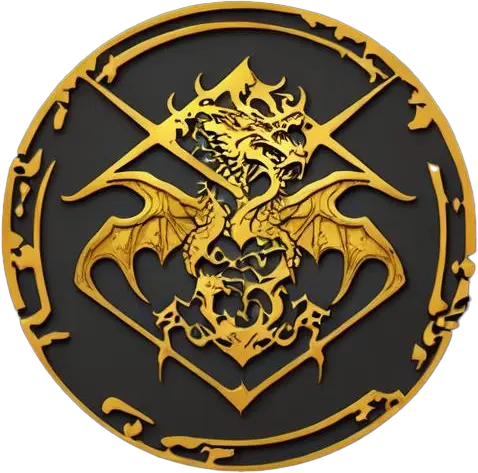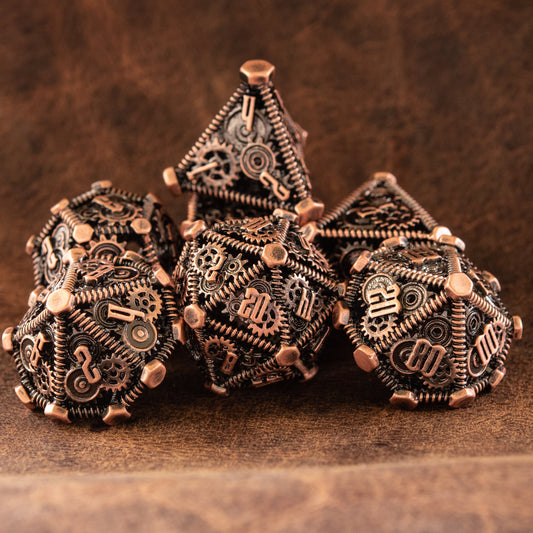Are DnD Dice Copyrighted A Deep Dive into the Legalities of Dungeons & Dragons Dice
Share
Are DnD Dice Copyrighted? A Deep Dive into the Legalities of Dungeons & Dragons Dice
Dungeons & Dragons (D&D) has been a cornerstone of tabletop role-playing games since its inception in the 1970s. One of the most iconic elements of D&D is its use of polyhedral dice, commonly referred to as D&D dice. These dice come in various shapes and sizes, each playing a crucial role in the mechanics of the game. But a question that often arises among enthusiasts and creators alike is: Are D&D dice copyrighted? This article will explore the intricacies of copyright law as it pertains to D&D dice, providing a comprehensive understanding of the legal landscape.
Understanding Copyright and Trademarks in the Context of D&D
Before delving into the specifics of D&D dice, it's essential to understand the difference between copyright and trademarks. Copyright protects original works of authorship, such as literary, dramatic, musical, and certain other intellectual works. Trademarks, on the other hand, protect words, phrases, symbols, or designs identifying the source of goods or services.
The Origin of D&D Dice
D&D dice are a set of polyhedral dice that typically include a four-sided die (d4), six-sided die (d6), eight-sided die (d8), ten-sided die (d10), twelve-sided die (d12), and twenty-sided die (d20). These dice are used to determine the outcomes of various actions within the game, adding an element of chance and uncertainty to gameplay.
The use of polyhedral dice in gaming predates D&D, with historical evidence of their use in ancient civilizations. However, D&D popularized their use in modern tabletop gaming, making them synonymous with the game.
Are D&D Dice Copyrighted?
The short answer is no, the concept of polyhedral dice itself is not copyrighted. The shapes and functions of these dice are considered to be in the public domain, meaning that anyone can produce and sell polyhedral dice without infringing on any copyrights. This is because the shapes of the dice are not original works of authorship; they are geometric shapes that have been used for centuries.
However, there are certain aspects of D&D dice that can be protected by copyright or trademark law:
-
Design and Artwork: If the dice feature unique designs, artwork, or symbols that are original creations, these elements can be protected by copyright. For example, if a company creates a set of dice with intricate designs or symbols specific to their brand, those designs can be copyrighted.
-
Brand Names and Logos: If the dice are branded with a specific name or logo, these can be protected by trademark law. For instance, the name "Dungeons & Dragons" and the associated logo are trademarks of Wizards of the Coast, the company that publishes D&D.
-
Packaging and Presentation: The way the dice are packaged and presented can also be protected by trademark law if it is distinctive and associated with a particular brand.
Legal Precedents and Cases
There have been several legal cases and controversies related to D&D and its intellectual property. One notable case involved Elderwood Academy, a company that produces high-quality dice boxes and accessories. In 2020, Elderwood Academy faced backlash from the D&D community for attempting to trademark a design for a dice box that many considered to be a standard industry design. This case highlighted the fine line between protecting original creations and attempting to monopolize common industry practices.
Another relevant discussion revolves around the d20 system, a core mechanic in D&D gameplay. The d20 system itself is not copyrighted, but specific implementations and expressions of the system can be. Wizards of the Coast has allowed the use of the d20 system under the Open Gaming License (OGL), which permits other creators to use the system in their own games, provided they adhere to certain guidelines.
Creating and Selling Custom D&D Dice
For those interested in creating and selling custom D&D dice, it's crucial to be aware of the legal considerations:
-
Original Designs: Ensure that any designs, symbols, or artwork on the dice are original creations or are used with permission. Avoid using any copyrighted material from D&D or other sources without proper authorization.
-
Trademarks: Be cautious when using brand names, logos, or other trademarked elements. Avoid using the "Dungeons & Dragons" name or logo without permission from Wizards of the Coast.
-
Fonts and Typography: If using specific fonts or typography on the dice, verify that these are not copyrighted. Some fonts are protected by copyright, and using them without permission can lead to legal issues.
-
Consult Legal Experts: When in doubt, consult with a legal expert who specializes in intellectual property law. They can provide guidance on what is permissible and help avoid potential legal pitfalls.
The Role of the Open Gaming License (OGL)
The Open Gaming License (OGL) is a significant development in the tabletop gaming community. Introduced by Wizards of the Coast, the OGL allows third-party creators to use certain elements of D&D, including the d20 system, in their own games and products. The OGL has fostered a thriving ecosystem of independent creators who contribute to the broader D&D community.
However, it's essential to understand the limitations of the OGL. While it permits the use of certain mechanics and systems, it does not grant permission to use copyrighted material such as specific characters, stories, or artwork from D&D. Creators must carefully review the terms of the OGL to ensure compliance.
Common Misconceptions About D&D Dice and Copyright
There are several misconceptions about the copyright status of D&D dice:
-
Misconception: All D&D Dice Are Copyrighted: As previously mentioned, the shapes and functions of polyhedral dice are not copyrighted. Only original designs and artwork on the dice can be protected.
-
Misconception: Using D&D Dice Requires Permission from Wizards of the Coast: While using the D&D brand name or specific copyrighted elements requires permission, producing and using generic polyhedral dice does not.
-
Misconception: The d20 System Is Copyrighted: The d20 system itself is not copyrighted, but specific implementations and expressions of the system can be. The OGL allows for the use of the d20 system under certain conditions.
Best Practices for Custom Dice Makers
For those looking to create and sell custom D&D dice, here are some best practices to follow:
-
Create Original Designs: Focus on creating unique and original designs that set your dice apart from others. This not only helps avoid legal issues but also makes your product more appealing to customers.
-
Respect Intellectual Property: Avoid using copyrighted material without permission. This includes artwork, symbols, and fonts that are not your own creations.
-
Research and Due Diligence: Conduct thorough research to ensure that your designs do not infringe on existing copyrights or trademarks. This includes checking for similar designs that may already be protected.
-
Consult Legal Experts: When in doubt, seek advice from legal experts who specialize in intellectual property law. They can help navigate the complexities of copyright and trademark law and ensure that your products are legally compliant.
-
Leverage the OGL: If you plan to use elements of the d20 system or other aspects of D&D, familiarize yourself with the terms of the OGL. This can provide a framework for legally incorporating these elements into your products.
The Future of D&D Dice and Intellectual Property
As the popularity of D&D continues to grow, so too does the market for custom dice and related accessories. This growth brings both opportunities and challenges for creators. On one hand, there is a thriving community of gamers eager for unique and high-quality dice. On the other hand, the legal landscape surrounding intellectual property can be complex and challenging to navigate.
To succeed in this market, creators must balance innovation with respect for intellectual property rights. By creating original designs, conducting thorough research, and seeking legal advice when necessary, custom dice makers can thrive while avoiding legal pitfalls.
Community Perspectives on D&D Dice and Copyright
The D&D community is diverse and passionate, with many members actively engaged in discussions about copyright and intellectual property. Online forums such as Reddit and specialized communities like the Glowforge Owners Forum provide valuable insights and perspectives on these issues.
For example, in a discussion on the Glowforge Owners Forum, users debated the legality of using D&D-related designs in custom dice vaults and boxes. The consensus was that while general terms like "paladin" and "warlock" are not copyrighted, specific symbols and artwork associated with these classes might be. This highlights the importance of creating original artwork or obtaining permission to use existing designs.
Similarly, on Reddit, users have expressed confusion about the trademark status of the d20 system and the implications for creating games that use this mechanic. These discussions underscore the need for clear and accessible information about intellectual property rights in the tabletop gaming industry.
Case Studies: Successful Custom Dice Makers
To illustrate the potential for success in the custom dice market, let's look at a few case studies of companies that have navigated the legal landscape effectively:
-
Critical Role: Critical Role, a popular web series featuring professional voice actors playing D&D, has successfully launched its own line of custom dice. By creating unique designs and leveraging their brand, Critical Role has built a loyal customer base while respecting intellectual property rights.
-
Die Hard Dice: Die Hard Dice is another successful company that produces high-quality metal and polymer dice. They focus on original designs and have built a reputation for quality and innovation. Their success demonstrates the potential for custom dice makers who prioritize originality and craftsmanship.
-
Q-Workshop: Q-Workshop is known for its intricately designed dice, often featuring fantasy-themed artwork. They have successfully navigated the legal landscape by creating unique designs and avoiding the use of copyrighted material without permission.
Conclusion
The question of whether D&D dice are copyrighted is nuanced. While the shapes and functions of polyhedral dice are not copyrighted, original designs, artwork, and branding elements can be protected by copyright and trademark law. For creators looking to enter the custom dice market, it's essential to understand these legal distinctions and take steps to ensure compliance with intellectual property laws.
By focusing on originality, conducting thorough research, and seeking legal advice when necessary, custom dice makers can create unique and legally compliant products that resonate with the D&D community. As the market for tabletop gaming continues to grow, there are ample opportunities for innovation and success in the world of custom D&D dice.

